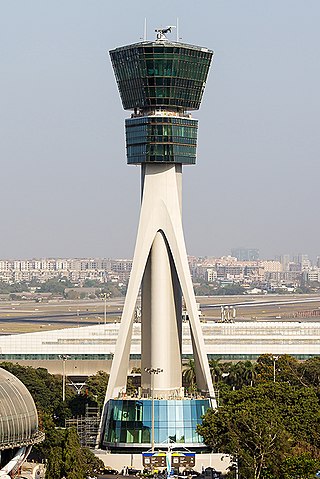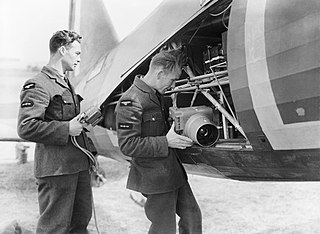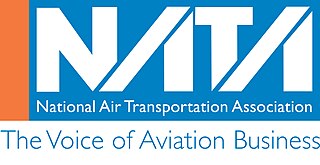
An airport is an aerodrome with extended facilities, mostly for commercial air transport. Airports usually consist of a landing area, which comprises an aerially accessible open space including at least one operationally active surface such as a runway for a plane to take off and to land or a helipad, and often includes adjacent utility buildings such as control towers, hangars and terminals, to maintain and monitor aircraft. Larger airports may have airport aprons, taxiway bridges, air traffic control centres, passenger facilities such as restaurants and lounges, and emergency services. In some countries, the US in particular, airports also typically have one or more fixed-base operators, serving general aviation.

Air traffic control (ATC) is a service provided by ground-based air traffic controllers who direct aircraft on the ground and through a given section of controlled airspace, and can provide advisory services to aircraft in non-controlled airspace. The primary purpose of ATC worldwide is to prevent collisions, organize and expedite the flow of air traffic, and provide information and other support for pilots.

The London International Airport is an international airport located in London, Ontario, Canada. It is located 5 nautical miles northeast of the city of London, Ontario and is classified as an airport of entry by Nav Canada. In 2011, the airport was listed as the 20th busiest airport in Canada in terms of aircraft movements with 94,747 travels. The airport posted a record 683,000 travelers in 2019 and 340,000 passengers in 2023. It provides services for cargo airlines and year-round flights with Air Canada Express and WestJet.
Aviation is the design, development, production, operation, and use of aircraft, especially heavier-than-air aircraft. Articles related to aviation include:

A fixed-base operator (FBO) is an organization granted the right by an airport to operate at the airport and provide aeronautical services such as fueling, hangaring, tie-down and parking, aircraft rental, aircraft maintenance, flight instruction, and similar services. In common practice, an FBO is the primary provider of support services to general aviation operators at a public-use airport and is on land leased from the airport, or, in rare cases, adjacent property as a "through the fence operation". In many smaller airports serving general aviation in remote or modest communities, the town itself may provide fuel services and operate a basic FBO facility. Most FBOs doing business at airports of high to moderate traffic volume are non-governmental organizations, either privately or publicly held companies.
SIA Engineering Company Limited is a Singaporean company specialising in aircraft maintenance, repair and overhaul (MRO) services in the Asia-Pacific. It is a wholly owned subsidiary of the Singapore Airlines Group (SIA), formed in 1992 with the separation of SIA's engineering division.

In all forms of aviation, ground crew are personnel that service aircraft while on the ground, during routine turn-around; as opposed to aircrew, who operate all aspects of an aircraft whilst in flight. The term ground crew is used by both civilian commercial airlines and in military aviation.

SATS Ltd. (SATS), an acronym derived from Singapore Airport Terminal Services, is a Singaporean airport service company that handles the main ground handling and in-flight catering service provider at its country's Changi Airport. SATS controls about 80% of Changi Airport's ground handling and catering business.

Region of Waterloo International Airport or Kitchener/Waterloo Airport is an international airport serving the Regional Municipality of Waterloo in Woolwich, Ontario, Canada, west of Toronto. It has year round daily flights to Edmonton, Vancouver, Victoria, Winnipeg, Calgary, Orlando, Halifax, Fort Lauderdale and Kelowna through Flair Airlines and WestJet. It also has seasonal flights to Cancun through Sunwing Airlines and Flair Airlines. In 2022, the airport ranked seventh-busiest in Canada by total aircraft movements and twentieth-busiest by passenger traffic.

In aviation, aircraft ground handling or ground operations defines the servicing of an aircraft while it is on the ground and (usually) parked at a terminal gate of an airport.
Jardine Airport Services Limited (JASL) trading as Jardine Aviation Services and JASG, formed in 1988 as a joint venture of Jardine Matheson and Air China Group. However, Jardines' involvement in Hong Kong aviation began as early as 1946 as Jardine Airways.

In the airline industry, a baggage handler is a person who loads and unloads baggage, and other cargo for transport via aircraft. With most airlines, the formal job title is "fleet service agent/clerk", though the position is commonly known amongst airline employees as a "ramp agent", due to the job's location on the airport ramp (tarmac).

Flamingo International Airport, also called Bonaire International Airport, is an international airport located near Kralendijk on the island of Bonaire in the Caribbean Netherlands. It was once the hub for BonaireExel and CuraçaoExel before they were rebranded as Dutch Antilles Express, and served as a secondary hub for Dutch Antilles Express and Insel Air. The airport is the fourth largest in the Dutch Caribbean, after Queen Beatrix International Airport on Aruba, Princess Juliana International Airport on Sint Maarten and Curaçao International Airport on Curaçao and is now the largest airport in the Caribbean Netherlands, with F. D. Roosevelt Airport in Sint Eustatius being the second largest and Juancho E. Yrausquin Airport in Saba being the smallest.

The airport apron, apron, flight line, or ramp is the area of an airport where aircraft are parked, unloaded or loaded, refueled, boarded, or maintained. Although the use of the apron is covered by regulations, such as lighting on vehicles, it is typically more accessible to users than the runway or taxiway. However, the apron is not usually open to the general public, and a permit may be required to gain access. An apron's designated areas for aircraft parking are called aircraft stands.

Ground support equipment (GSE) is the support equipment found at an airport, usually on the apron, the servicing area by the terminal. This equipment is used to service the aircraft between flights. As the name suggests, ground support equipment is there to support the operations of aircraft whilst on the ground. The role of this equipment generally involves ground power operations, aircraft mobility, and cargo/passenger loading operations.

Aviation boatswain's mate is a United States Navy occupational rating.

The National Air Transportation Association (NATA) is the public policy group that represents the interests of the general aviation business community before the Congress and federal, state and local government agencies. NATA, founded in 1940, represents nearly 2,300 aviation businesses.
The Academy of Technical Training is a privately owned institution which provides training programs in aviation security and safety, air traffic control, and management of aircraft accidents. The curriculum and courses are accredited and certified by the General Civil Aviation Authority.

The Civil Aviation Authority of Fiji (CAAF) is the civil aviation authority in the Republic of Fiji and is responsible for discharging functions on behalf of the Government of Fiji under the States responsibility to the Convention on International Civil Aviation, also known as the Chicago Convention on International Civil Aviation Organization (ICAO). CAAF regulates the activities of airport operators, air traffic control and air navigation service providers, airline operators, pilots and air traffic controllers, aircraft engineers, technicians, airports, airline contracting organisations and international air cargo operators in Fiji.

In commercial aviation, an outstation refers to an airport that is served by an air carrier but is not a hub, a focus city, nor a crew or maintenance base in that operator's network. Outstations often, but not necessarily, take the form of regional airports located in exurban or rural communities which handle lower passenger volumes and less-frequent service than hubs. For these reasons, outstations may lack passenger amenities and services which comprise an airline's typical customer experience standards. When an outstation is served by a hub-and-spoke style airline, it is common for its flights to depart early in the morning and arrive late at night due to scheduling patterns directing aircraft to remain-over-night (RON) for maximum fleet utilization.
















